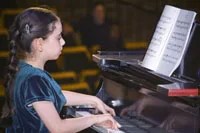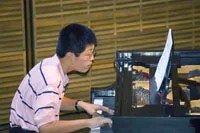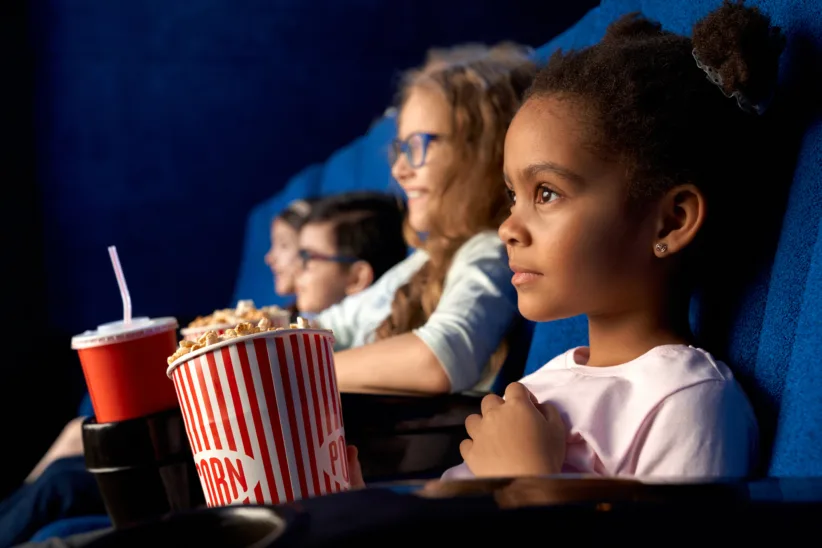“The stage is yours, my dear — take it from the top,” says the host, Christopher O’Riley of the radio show and soon-to-be TV series, From the Top: Live from Carnegie Hall, to 10-year-old Alice Burla of Hastings-on-Hudson. Burla (pictured below) sits straight and confident on the piano bench, wearing a beautiful green dress and sparkly barrettes in her hair, as the cameras rotate around her. The audience can barely see her over the four giant black Steinway grand pianos dominating the stage, and she even has to ask the stage director to raise her piano bench a bit.

“Four, three, two…roll!” the director yells as the audience becomes silent and Alice’s tiny pale fingers start to dance across the piano keys. “I never get nervous on stage,” she says. “I love performing. It’s one of my favorite things about playing.”
From the Top: Life from Carnegie Hall strives to showcase the most talented young musicians in the country, combining mind-blowing musical performances with humor and dialogue. The show has been a popular NPR radio program for six years, and will now be aired as a 13-part television series on PBS member stations, starting in April, 2007.
Burla is one of the favorites of this particular episode, getting special attention as the youngest performer, and in fact, the youngest student ever admitted to the Pre-College Division at Juilliard where she auditioned at age 6. Coming from a family of musicians, she started improvising on the piano at age 2, and started taking lessons at 4. After only a few months of instruction, she began performing, demonstrating her intrepid stage presence at the Markham Music Festival where she performed as a soloist in front of 700 people. She practices three to five hours a day, every day of the week, and sometimes more on weekends. “I never get tired of it. If I want to be good, I have to practice,” she explains.

Fourteen year-old Peng Peng Gong is another young, talented, local pianist who will appear on this episode. Gong (pictured above) started playing when he was 4 and moved to midtown Manhattan in 2002 from Shanghai, China to attend Juilliard. Gong has a goofy but captivating presence on stage. With big glasses and braces, he strides out on the stage eating a banana, and jokes with O’Riley about how it helps to calm his nerves before performing. However, the moment he sits down on the piano bench and lightly rests his fingers on the keys, any teenage awkwardness disappears. He gives an animated performance, moving his entire body with the music and leaning forward at the crescendos to bang out powerful notes — then pulling back to delicately caress the keys. “I keep my fingertips solid and my shoulders free,” he tells the audience.
Later, during a taping break, Gong explains that his father was his first piano teacher. Within months, he admits, he thought he knew more than his dad, refusing to listen to his directions. He currently practices six to eight hours a day, and can memorize a complicated concerto in about a week and a typical piano piece in only three to four days. “I have to motivate myself to practice, but to me, it’s a good feeling.”
Gong also composes many of his own pieces, which already include works for string quintet, and a symphony orchestra. He recently performed in the Juilliard School’s 100th anniversary show, where he met conductor-composer John Williams, soprano Renée Fleming, actor Kevin Kline, violinist Itzhak Perlman, and pianist Emanuel Ax. He acknowledges it was exciting to meet so many famous people, but says that he treats an audience as just an audience and that he usually doesn’t think about how important or eventful a concert is. “All the stages are the same to me. Wherever I go — whether it’s New York or Paris or Mars or anywhere else! Wherever I am, I feel the same.”
Gong says he doesn’t think about the future too much and that he’ll probably be doing the same thing in 10 years, only be better at it. “I’m just the way that I am. I’m not sad about the past and I’m not really crazy about what happens 10 years after.” Ten-year-old Burla had a similar reply; fame is not her priority. “It doesn’t really depend on being famous because you could be famous and really bad. I want to be a great piano player,” she says with a maturity well beyond her years.
Many people like to call these kids prodigies, and by definition, they would certainly fit into that category. Gong even won the Jiang-Su Youth Piano Competition’s “Piano Prodigy Prize” at the age of 6. Having already accomplished so much and being so ambitious at such a young age, it’s hard to image that these are still just children who have their entire lives ahead of them. But then O’Riley looks down at Alice Burla as she smoothes out her velvety green gown, her eyes averted. “Alice, isn’t there another reason you like to play the piano so much besides the beautiful music?” “Yes,” she replies, “I like to wear different dresses.”
For more information on From the Top, go to www.FromTheTop.org.





















